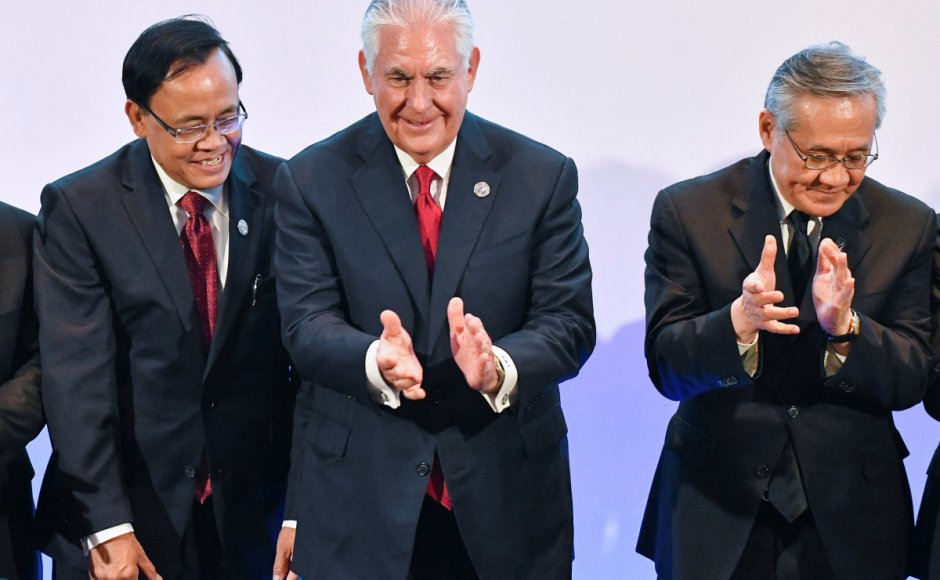US Secretary of State Rex Tillerson is visiting the Philippines, Thailand and Malaysia for a series of regional meetings to broaden and enhance the United States’ economic and security interests. The former Exxon Mobil chief executive arrived in Manila last weekend and is now in Thailand, where he will pay his respects to the late King Bhumibol Adulyadej, who died in 2016.
For the final leg of the trip, Tillerson is expected to touch down in Kuala Lumpur this evening and scheduled to meet Malaysia’s Prime Minister Najib Razak and Deputy Prime Minister Ahmad Zahid Hamidi.
Here’s what we can expect from Tillerson’s visit to the Malaysian capital:
1. North Korea in the spotlight
Containing Pyongyang’s nuclear and missile programmes has dominated the planning of Tillerson’s visit to the region. While the State Department’s acting assistant secretary Susan Thornton confirmed last week that there will be no meeting with North Korea’s foreign minister in Manila, the rogue state is a “high administration priority” that will not only dominate talks in Asia, but worldwide.
Analysts agree North Korea will be the US’ topmost priority in this Southeast Asia visit.
The aim is to shore up the region’s support to “supplement” US policies in Northeast Asia.
Dr Ooi Kee Beng, executive director at think-tank Penang Institute said: “US interest in Asia tends to be more about Northeast Asia than Southeast Asia”.
Furthermore, neither Malaysia nor Thailand has any unique clout to influence North Korea individually.
In Malaysia, Ooi told Asian Correspondent he expected the US will call for “tighter control” of the rogue Asian country’s activities with Malaysia.
This is a request that will gain traction in Malaysia, says Dr Tang Siew Mun, a senior fellow at ISEAS-Yusof Ishak Institute, given the fallout between the two nations following the bizarre assassination of Kim Jong Nam, the elder half-brother of North Korea’s leader Kim Jong Un, on Malaysian soil.
2. “No game” compared to China
Malaysia would likely look to counter its unhealthy economic dependence on China, who is its chief trading partner and source of foreign direct investment – a position that is making it hesitant to be more vocal to Beijing about its claims on the South China Sea.
However, this would be a “mismatch” between what Malaysia wants and what US can actually provide, according to Tang.
“The US has ‘no game’ in the Malaysian economy, from a political standpoint,” Tang said, referring to the US’ lack of leverage or resources to provide loans for infrastructure development or “the luxury of a host of state-owned enterprises” to undertake investments Beijing has.
Although local news source New Straits Times touts total bilateral trade between Malaysia and US is growing, the US still lags behind China, Malaysia’s International Trade and Industry Minister Mustapa Mohamed said earlier this year.
Following US President Donald Trump’s listing of Malaysia as one of “trade cheats” responsible for the US’ deficit earlier this year, Harris Zainul, a researcher at the Institute of Strategic and International Studies Malaysia, predicts this may be another factor limiting “potential opportunities for enhanced Malaysia-US trade”.
And with the failure of the Trans-Pacific Partnership, there isn’t an infrastructure to base future stronger ties between the two countries either. With this in mind, there is little US can do to broaden its economic ties with Malaysia, according to Ooi.
3. 1MDB in the background
How will the US Department of Justice’s civil suits – alleging money laundering by state investment fund 1MDB, established by Najib – factor in the upcoming meetings?
The DoJ’s latest suit is seeking to seize more than half a billion US dollars’ worth of assets, including jewellery and paintings, bringing the total claims to more than US$1.7 billion.
“We simply will not allow the US to be a place where corrupt individuals can expect to hide assets and lavishly spend money that should be used for the benefit of citizens of other nations,” US’ acting assistant attorney-general Kenneth Blanco said in a statement in June.
Journalist Ralph Jenning wrote in Forbes these claims may lead Washington to be “hesitant to re-friend” Malaysia.
However, Malaysia’s Foreign Ministry yesterday said Tillerson’s visit affirmed the US’ “commitment” to “further strengthen bilateral ties” with Malaysia.
This article first appeared in Asian Correspondent on 8 August 2017.





